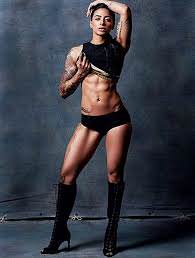Posted by Anam M. Khan
Bigg Boss is one of the most popular reality shows in South Asia. It requires a number of contestants to live in a house isolated from the world, who are constantly surveilled. The contestants cannot leave the house or use any means of communication with the outside world. This year was the tenth season and had extremely controversial material, with seven celebrities and eight commoners living in the house. This year the viewers witnessed everything from slut shaming, objectification of women, and body shaming. Some of the female contestants, such as Monalisa and Lopamudra, were targeted for wearing skimpy clothes or for putting on excessive makeup.
Monalisa was also slut-shamed by the contestants on numerous occasions. Another contestants’s fiancé Priya Saini stated: “I hate Mona Lisa; she is a despo. Woh jab dekho Manu ke aas paas ghumti rehti hain.” (Whenever you see her she is hovering around [my fiance] Manu.) While doing a task, Monalisa was supposed to go in a jacuzzi with another contestant. While watching the task the other contestant stated: “Woh chahti hai ki woh uska haath pakre” (She just wants him to hold her hand). In another task the self-proclaimed saint and an ex-contestant, Om Swami, who had previously on national television boasted about how he assaulted actress Elizabeth Taylor because her dress was too revealing, stated: “Raat mein dekhiya, Mona ki Romi ke saath mein sagai ho chuki hai, aur uske bawajood Manu ke saath chipak kar aise. Bigg Boss ke ghar par rakhe gayi toh aapke ghar ki mahilaon par bura asar parega.” (Mona is engaged to Romi. Despite that I saw her snuggling with Manu. If the viewers keep Mona in the house then the other women in the House will get corrupted).
Insulting or embarrassing a woman for her sexual behaviour or dressing due to her gender is unacceptable. Destructive gossip always has real consequences for women – Monalisa was briefly shunned by her boyfriend of 8 years as a result of the toxic slut-shaming she faced. Furthermore, we never see men face the same scrutiny, policing and control over their sexuality.
Another celebrity contestant, Gurbani Judge aka Bani J, a VJ, a model and an actress, was constantly targeted for her fondness for bodybuilding, for her tattoos and for eating healthy. She was asked by a casting director whether she had become a man and grown a penis yet. In South Asia, women’s bodies are constantly subjected to evaluation and are expected to fulfil a perfect physical structure defined by the society. A woman’s body is not considered as anything more than a sexual object. In the Bigg Boss house Bani was body-shamed numerous times, with her self-worth being reduced to her tattoos and physique. It is very common in South Asia that women’s worldly achievements are overlooked and the society just assesses their worth by their physical characteristics.

A photo of the built fitness model Bani
Body shaming and the gender stereotypes are so imbibed in us that we may not realize that we have either taken part in body shaming or have been body shamed. Nonetheless, this flagrant sexism ought to set off alarm bells in every viewer’s mind. Other contestants have either explicitly or implicitly called Bani a man, stripping away her womanhood for not conforming to the ideal idea of a feminine woman. Om told Manu to try to woo Bani, to which Manu said: “Do aadmi apas mein kya talwar larwai gayi.” (It will be like two men fighting with swords.) He then said he would be embarrassed to be seen in public with a girl like Bani.
Also Read: How I Went From Body Shaming To Body Positive.
As humans, we all have the right to determine what we want our bodies to look like. When these men were upset, annoyed or intimidated by Bani, they automatically reverted to criticizing her person’s appearance. It was even worse when other female contestants shamed her, like Lopamudra who labeled Bani ‘fake’ and ‘ugly’ and accused her of having Botox and fillers done. Body-shaming of women is highly prevalent in South Asia, which often shatters women’s respect and self-esteem. No wonder South Asia is considered to be one of the worst places to be an ordinary woman. An ordinary woman who is trapped between tradition and modernity. An ordinary woman who may find herself confined in four walls of their home, unable to work or study, constantly told that her physical characteristics are the only thing that is really important in her, as that determines the finding of a suitable groom.
Bani stood out for her fearless personality and physique and “live and let live” attitude. Bani was the only contestant who fearlessly spoke up against Manu when he called actress Sunny Leone his ‘maal‘ (object). She strongly voiced her disgust about how Om touched Sunny Leone inappropriately while sitting next to her, which angered Om, who responded by verbally attacking her. Om’s prejudices were so deeply embedded in him that it was too much for him to accept a woman with tattoos. He hastily made character presumptions dictated by his preconceived notions about “non-girly” women. He predictably told her that her actions were against “Indian culture” and targeted her constantly. The continuous build up of venom led to Om throwing urine on Bani to win a task.
Having tattoos does not have any relation with the moral character of a human being. Having tattoos should not brand you. It is a form of self-expression, an individual choice. Why is that people in South Asia can’t see past the ink that’s on a person’s skin? Why is it that only women have to deal with stigma, objectification, slut-shaming and body-shaming if they are tattooed? It is important for people in South Asia to realize that women’s bodies have the right to exist in non-sexual state and that beauty is subjective. Being a strong woman, both physically and mentally, in no way means that you are less of a female.
Women in South Asia are working hard to break away from gender stereotypes, so watching people get away with sexist statements and jokes on national television is very off putting. It also takes the gender struggle a step back, as the viewers start to internalise behaviours seen on the television. It sends a message to men in the form of bosses, uncles, friends, husbands that commenting on a girl’s body is acceptable. People need to break away from the preconceived ideals of feminine body that accepts women only if they fit in a trim societal definition.
Anam M. Khan is an Advocate at High Court, Feminist, Human Rights Activist, Humanitarian, Founder and President of the 1st helpline and support group for women in Distress ‘Anasi’ in Pakistan. She tweets at @AnamMahmud1.
About the author(s)
Guest Writers are writers who occasionally write on FII.




